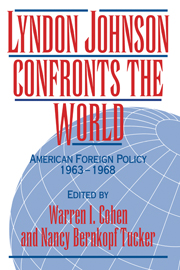Book contents
- Frontmatter
- Contents
- Dedication
- Acknowledgments
- List of Contributors
- Introduction
- 1 Lyndon B. Johnson: Change and Continuity
- 2 Johnson, Vietnam, and Tocqueville
- 3 “A Time in the Tide of Men's Affairs”: Lyndon Johnson and Vietnam
- 4 Threats, Opportunities, and Frustrations in East Asia
- 5 Toward Disillusionment and Disengagement in South Asia
- 6 Lyndon B. Johnson, Germany, and “the End of the Cold War”
- 7 The Promise of Progress: U.S. Relations with Latin America During the Administration of Lyndon B. Johnson
- 8 Keeping Africa off the Agenda
- 9 Balancing American Interests in the Middle East: Lyndon Baines Johnson vs. Gamal Abdul Nasser
- 10 Lyndon Johnson: A Final Reckoning
- Suggestions for Further Reading
- Index
2 - Johnson, Vietnam, and Tocqueville
Published online by Cambridge University Press: 05 June 2012
- Frontmatter
- Contents
- Dedication
- Acknowledgments
- List of Contributors
- Introduction
- 1 Lyndon B. Johnson: Change and Continuity
- 2 Johnson, Vietnam, and Tocqueville
- 3 “A Time in the Tide of Men's Affairs”: Lyndon Johnson and Vietnam
- 4 Threats, Opportunities, and Frustrations in East Asia
- 5 Toward Disillusionment and Disengagement in South Asia
- 6 Lyndon B. Johnson, Germany, and “the End of the Cold War”
- 7 The Promise of Progress: U.S. Relations with Latin America During the Administration of Lyndon B. Johnson
- 8 Keeping Africa off the Agenda
- 9 Balancing American Interests in the Middle East: Lyndon Baines Johnson vs. Gamal Abdul Nasser
- 10 Lyndon Johnson: A Final Reckoning
- Suggestions for Further Reading
- Index
Summary
Conducting a successful foreign policy for the United States requires a dual approach: constructing a strategy that is workable abroad, and developing a political explanation that creates and maintains sufficient consensus at home. The Founders believed that the two approaches were two sides of the same coin. Nearly fifty years later, however, a French visitor, Alexis de Tocqueville, noted a change: during the Jacksonian era Americans enjoyed considerable security in foreign affairs, so they were engrossed in their favorite public activity of making money for themselves. Tocqueville wondered how Americans would deal with foreign policy crises when their nation became a great power. He was not sanguine, but he did define the problem that 130 years later helped destroy Lyndon Johnson's policies in Vietnam: “[A] democracy,” Tocqueville wrote, “can only with great difficulty regulate the details of an important [foreign policy] undertaking, persevere in a fixed design, and work out its execution in spite of serious obstacles. It cannot combine its measures with secrecy or await their consequences with patience.” He believed democracy of the American variety to be singularly ill suited for conducting a successful diplomacy.
Several presidents, notably Woodrow Wilson in 1919–20 and Franklin D. Roosevelt between 1934 and 1939, dramatically failed to solve Tocqueville's problem. No chief executive solved it more successfully than did Harry Truman when, on March 23,1947, he issued his Truman Doctrine, which, by defining the world as divided between free and enslaved and shrewdly demanding that Americans decide which side they were on, created an anticommunist consensus that stretched across the next four decades.
- Type
- Chapter
- Information
- Lyndon Johnson Confronts the WorldAmerican Foreign Policy 1963–1968, pp. 31 - 56Publisher: Cambridge University PressPrint publication year: 1995



